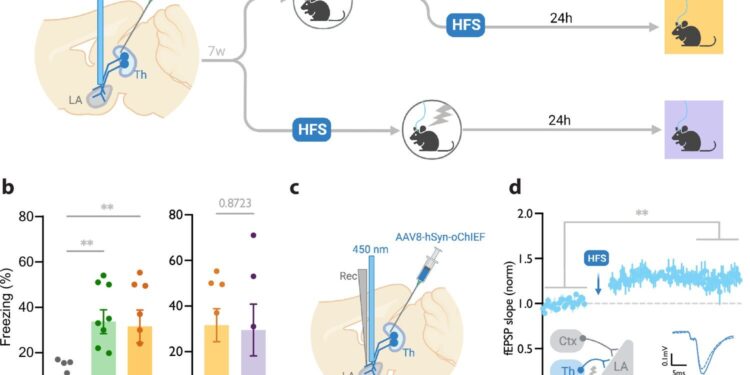A homosynaptic long-term potentiation (LTP) stimulus a few minutes before, after, or 24 hours after weak associative conditioning produces a lasting memory. Credit: eLife (2023). DOI: 10.7554/eLife.91421
There is a legend that hundreds of years ago, long before the advent of printing presses, computers, or telephones, a special method was used to remember important events, such as land transfers, crucial agreements, or marriages. According to the legend, a child was chosen to witness the event and immediately thrown into a river. This extreme combination of events was supposed to ensure that the child would never forget this particular event.
But why would such a method have worked? While this historical method may seem extreme, our ancestors may have understood something crucial: when an event is associated with a strong emotional reaction, it becomes easier to remember.
For a long time, researchers have been able to explain why some events are stored in our long-term memory while others are not. However, learning and memory may not be as simple as previously thought. New research from DANDRITE shows that experiences that are not directly linked to a memory can still impact the strength of that memory, paving the way for the development of entirely new memory-focused learning tools.
New research expands dominant memory model
Traditionally, learning and memory formation are explained by the Hebb model, which suggests that synapses in the brain are strengthened by the repeated simultaneous activation of neurons. This means that when two neurons are activated repeatedly, the connection between them becomes stronger, which is called “synaptic plasticity”. According to Hebb’s rule (“neurons that fire together, wire together”), this process is strictly input-specific and depends on the simultaneous activation of both neurons.
However, new research from Sadegh Nabavi’s lab at DANDRITE shows that learning and memory are not so simple.
Synaptic plasticity is not necessarily limited to the simultaneous activation of specific synapses. Synaptic changes can occur at nearby synapses that were not directly activated during the initial experience, a process known as “heterosynaptic plasticity.”
In a recent article in the journal eLifeDANDRITE researchers demonstrate that memory can also be strengthened by subsequent, unrelated experiences if they elicit a strong response. This means that the process of transforming a fleeting experience into a lasting memory is not limited to the time the experience occurred or the specific synapses that were activated. Rather, this process can be influenced by both past and future events, with time delays of up to one day.
This contrasts with the Hebbian model, which focuses on the simultaneous activation of neurons as the primary mechanism of learning and memory formation.
Paving the way for new learning technologies
This new knowledge provides insight into how to treat cognitive and memory disorders. By gaining more precise knowledge of how weak memories are strengthened, innovative therapies can be developed to improve memory and learning in people with cognitive disorders.
If we go back to the beginning of the legend, we see that our ancestors were ahead of their time in understanding memory. Their method, while extreme, reflects an early view of how powerful experiences can enhance memory – something we are now beginning to understand on a more scientific level.
More information:
Islam Faress et al, Non-Hebbian Plasticity Transforms Transient Experiences into Enduring Memories, eLife (2024). DOI: 10.7554/eLife.91421.3
eLife
Provided by Aarhus University
Quote:Memory can be strengthened by unrelated experiences, study finds (2024, August 20) retrieved August 20, 2024 from
This document is subject to copyright. Apart from any fair dealing for the purpose of private study or research, no part may be reproduced without written permission. The content is provided for informational purposes only.



